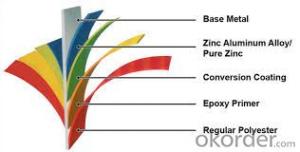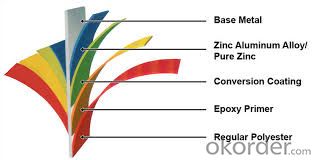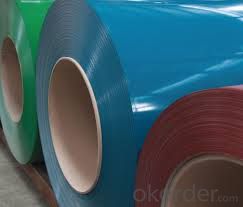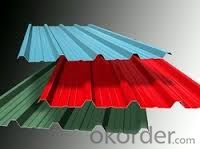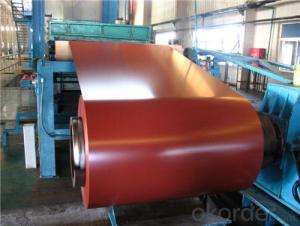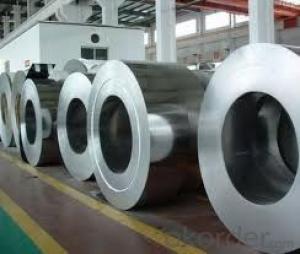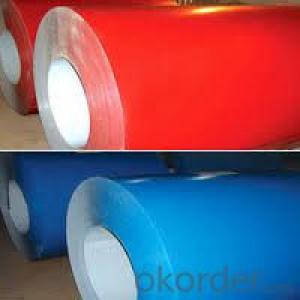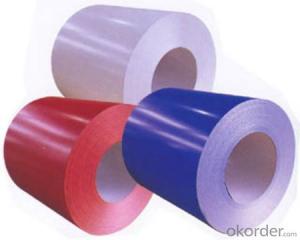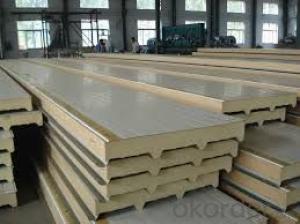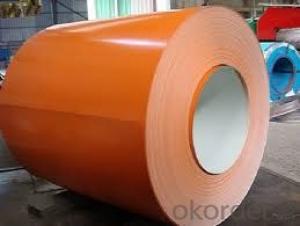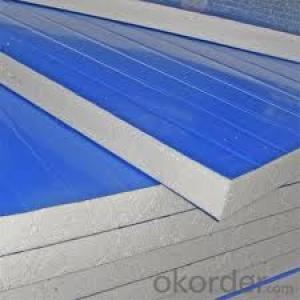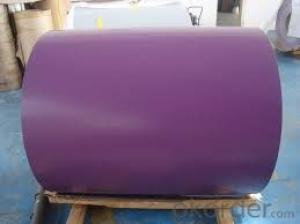PPGI/Pre-painted Cold Rolled Galvanized Steel Sheet Coil/PPGI
- Loading Port:
- China main port
- Payment Terms:
- TT OR LC
- Min Order Qty:
- 25 m.t.
- Supply Capability:
- 1000 m.t./month
OKorder Service Pledge
OKorder Financial Service
You Might Also Like
Product Description
Specifications;
1. Aluzinc coating mass: 30g-275g/sqm
2. Coil weight: 4-6 tons per coil
3. Edge treatment: Mill edge or cut edge.
4. Technical treatment: Bright annealed, flatting, cold harden.
5. Surface treatment: Annealed, bright finish, dull/bright finish, slit edge.
6. Spangle: Normal/small/big/zero spangle.
7. Delivery terms: FOB / C&R / CIF
8. Supply Ability: 30000MT/month
9. Application: The construction industry: The roof structure, keel, grill, Clapboard, ceilings, fire shutter doors, etc; The light industry, the Automobile, agriculture, animal husbandry, fishery, casing of household Electronic application, civilian smoke stack, etc.
10. Delivery time: Within 30 days after the receipt of L/C or Signed the contract or according to customer's requirement.
Special design available according to requirement; Anti-corrosion And high-temperature resistant with black painting; All the production process Are made under the ISO9001: 2000 strictly
Second Glance of Photo
Galvanzied steel coil( GI, CRC)
Color coated steel coil(PPGI)
Package: Sea worthy Export Packing Standard export and seaworthy packing. (waterproof paper and metal sheet protection with fluted rings at inner and outer edges, 4 eye bands and 4 circumferential bands fasten the coil)
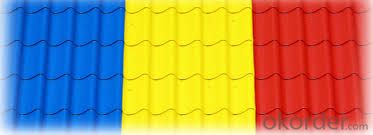
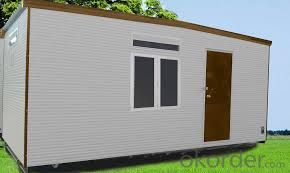
FAQ
1. Do you have QC team?
Yeah, sure, our QC team is very important, they will keep the quality control for our products.for quality inspection every day.
- Q: I need to know which cookware set is better. We are trying to get rid of the ones we have here. They are Teflon. I have heard that stainless steel (aluminum) and hard Ionized are good, but which is the best one.
- I have a set of Stainless and individual pots and saute/frying pans that are non-stick. Calphalon is a good brand and should serve you well for now. They are easy to clean and work well for most dishes. If I looked at the right set of pots, these should also be oven safe which is great for stews and roasts. If you get into cooking you will probably want to purchase some stainless for preparing sauces. The fond (which is the basis for many quick sauces) from meat, poultry and fish will not accumulate on non-stick pans as well as stainless pans.
- Q: Is steel with a black coloring as strong as regular steel. if you are asking why i have two wordsBlack Katana.I know a katana is not made with normal steel, it is made of two types with varying grades of carbon to give it speacial properties, i just want to know if the black will make a difference.
- The term tensile potential refers back to the quantity of tensile (stretching) rigidity a textile can stand up to in the previous breaking or failing. the in simple terms suitable tensile potential of a textile is calculated by making use of dividing the element of the textile examined (the pass area) by making use of the strain located on the textile, regularly expressed in terms of pounds or much consistent with sq. inch of fabric. Tensile potential is an considerable degree of a textile's skill to accomplish in an utility, and the scale is extensively used whilst describing the residences of metals and alloys.
- Q: What are the different types of steel coil surface treatments for corrosion resistance?
- To enhance corrosion resistance, different methods are utilized for treating the surface of steel coils. These treatments create a protective layer that prolongs the lifespan of the steel and prevents corrosion. Some commonly used treatments for corrosion resistance include: 1. Galvanizing: Widely recognized as an effective method, galvanizing involves applying a layer of zinc to the steel coil's surface. The zinc acts as a sacrificial anode, corroding before the steel, thus safeguarding it against rust and corrosion. 2. Chromate conversion coating: This treatment entails applying a chromate-based solution to the steel coil's surface. The chromate forms a thin film that serves as a protective barrier against corrosion. Moreover, it improves the adherence of paint or other coatings that may be applied subsequently. 3. Phosphating: Phosphating is a process where a phosphate coating is added to the steel coil. This coating establishes excellent corrosion resistance by chemically bonding with the steel surface. It also enhances the adherence of subsequent coatings or paints. 4. Organic coatings: These coatings comprise paint or epoxy and are applied to the steel coil to create a barrier between the steel and its surroundings. They offer corrosion resistance and enhance aesthetic appeal. The selection of organic coating depends on the specific application and the desired level of corrosion protection. 5. Zinc-rich paint: Similar to galvanizing, zinc-rich paint contains a high concentration of zinc particles. When applied to the steel coil, these particles provide sacrificial protection, preventing corrosion. This coating is commonly employed in harsh environments or for steel coils exposed to frequent moisture or saltwater. It is important to consider various factors such as the application, environment, budget, and required level of corrosion resistance when choosing a surface treatment. Consulting with a steel coil manufacturer or corrosion specialist is advisable to determine the most suitable treatment for a specific situation.
- Q: What are the dimensions of steel coils used in the automotive industry?
- The dimensions of steel coils used in the automotive industry can vary depending on the specific application, but common dimensions range from 0.5mm to 3mm in thickness and 600mm to 2000mm in width.
- Q: How are steel coils used in the production of metal containers?
- Steel coils are widely used in the production of metal containers due to their versatility and strength. The process of manufacturing metal containers typically involves several steps, and steel coils play a crucial role in each of these stages. Firstly, steel coils are used as the primary raw material in the production of metal containers. The coils are made of high-quality steel that is rolled into a continuous sheet, ensuring consistent thickness and durability. This sheet is then cut into specific widths and lengths according to the size requirements of the containers. Once the steel coils are cut into the desired dimensions, they are formed into the shape of the container using various techniques. One common method is called roll forming, where the steel coil is passed through a series of roll dies that progressively shape it into the desired container shape. This can be done to create containers of various sizes and designs, such as cans, drums, or even large industrial containers. After the initial forming process, the steel coils are further processed to enhance their strength and durability. This can involve heat treatment, where the coils are exposed to high temperatures to increase their hardness and resistance to wear and tear. Other processes like annealing and quenching may also be utilized to improve the steel's properties. Once the containers are formed and processed, they undergo additional fabrication steps such as welding or sealing to ensure their structural integrity. Steel coils are often used in these processes as well, as they provide a strong and reliable material to create sturdy seams and joints. Finally, the metal containers are finished by applying various coatings or treatments to protect them from rust, corrosion, or other environmental factors. Steel coils can be coated with materials such as paint, epoxy, or zinc to enhance their resistance to these elements, ensuring the longevity of the containers. In summary, steel coils are essential components in the production of metal containers. From being the primary raw material to being used in forming, processing, and finishing, steel coils provide the strength, durability, and versatility necessary for the manufacturing of reliable metal containers for various industries.
- Q: I want to know what to my wash stainless fridge door with before applying the stainless steel polish.
- I just use a regular spray on kitchen cleaner like 409. Then after I do that to prevent the streaks, just use baby oil. Put a tiny bit on a paper towel and wipe it over the doors. I learned this from online and from a pal that is in the navy. They can't have streaks on anything for navy inspections.
- Q: How are steel coils used in the manufacturing of HVAC systems?
- Steel coils are used in the manufacturing of HVAC systems primarily for heat transfer purposes. They are typically used in air conditioning and refrigeration systems to facilitate the transfer of heat between the refrigerant and the surrounding air. The coils, usually made of copper or aluminum tubes with steel fins, are designed to maximize the surface area available for heat exchange, allowing for efficient cooling or heating of the air passing through the system.
- Q: I just bought a dpms ar15 and it says if I shoot steel cases (laquer coated) or foreign ammo it voids the warranty. But before I knew this I bought 200 rounds of Russian steel cased anmo. Think I should just shoot there two hundred and not buy anymore? Some people say all they shoot is steel cased ammo and have no problemAny advice is appreciated
- Steel Case Ammo
- Q: Are steel coils used in automotive manufacturing?
- Yes, steel coils are commonly used in automotive manufacturing. They are used to produce various components such as body panels, chassis parts, and structural reinforcements due to their strength, durability, and formability.
- Q: Can steel coils be used in the production of automotive parts?
- Yes, steel coils can be used in the production of automotive parts. Steel coils are often used in the manufacturing process of various automotive components such as body panels, frames, chassis, suspension parts, and engine parts. The steel coils are typically processed through various methods such as cutting, stamping, bending, and welding to shape them into the desired automotive parts. Steel is a preferred material for automotive parts due to its strength, durability, and resistance to corrosion. Moreover, steel coils are available in different grades and thicknesses, allowing manufacturers to tailor the material properties to meet specific requirements for different automotive applications. Overall, steel coils play a critical role in the production of automotive parts, contributing to the performance, safety, and longevity of vehicles.
Send your message to us
PPGI/Pre-painted Cold Rolled Galvanized Steel Sheet Coil/PPGI
- Loading Port:
- China main port
- Payment Terms:
- TT OR LC
- Min Order Qty:
- 25 m.t.
- Supply Capability:
- 1000 m.t./month
OKorder Service Pledge
OKorder Financial Service
Similar products
Hot products
Hot Searches
Related keywords
